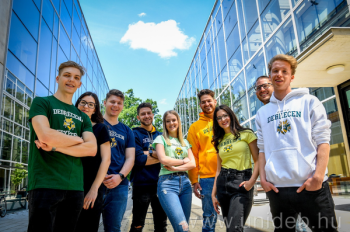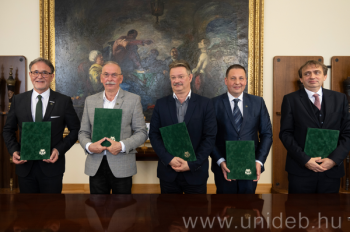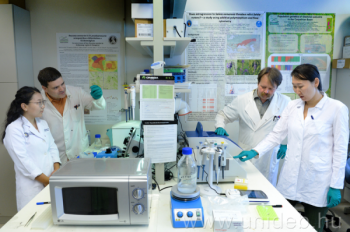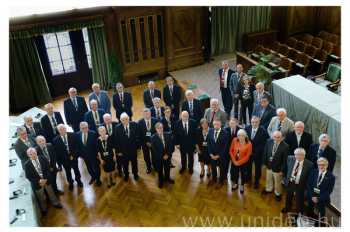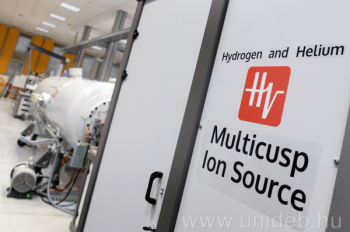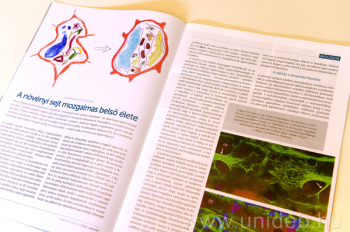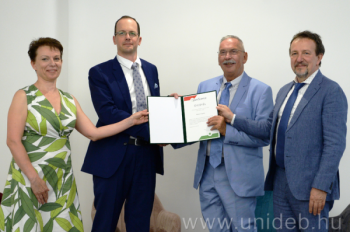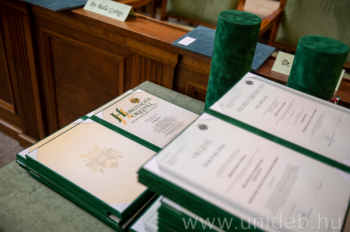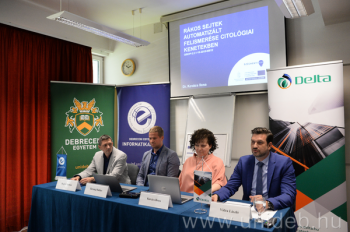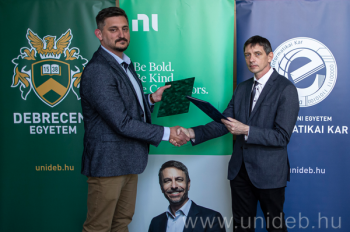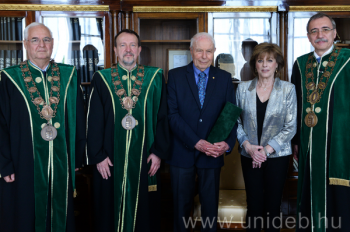Two Mongolian biologists are conducting evolutionary genetic research at the Faculty of Science and Technology (TTK) of the University of Debrecen through a mobility grant of the Hungarian Academy of Sciences. As part of the joint Hungarian-Mongolian research, specialists from Debrecen have also visited Mongolia on a study trip, studying kestrels and peregrine falcons, and have given bioinformatics training to their colleagues in Ulaanbaatar.
A Tudományos és Társadalmi Tanácsadó Testület [Scientific and Social Advisory Board] of fifty-seven members supporting the work of the Chairman of the Board of Trustees of Count István Tisza Foundation for the University of Debrecen (GTIDEA), which operates and maintains the University of Debrecen, has been established. At the inaugural meeting on Wednesday, the dignitaries from Hungary and abroad making up the board introduced themselves and received their credentials at the same time.
The first piece of equipment prepared by the University of Debrecen to be used in space has been completed, and it is scheduled to go into outer space at the beginning of next year. This unique instrument will measure radiation that affects technical equipment in the cosmic environment. The innovation created by DE SPACE’s Radiation Physics Research Group was presented at a workshop held in the Borsay Castle of our Mád Campus.
On the ESA Day held at ATOMKI on Thursday, European Space Agency (ESA) staff members could take a look at the relevant instrument park of the University of Debrecen and the Nuclear Research Institute of Eötvös Loránd Kutatási Hálózat [Eötvös Loránd Research Network] as well as learn about the investigations related to space research conducted here. Hungary’s Ministerial Commissioner for Space Research Ms. Orsolya Ferencz also participated in the event.
Investigations by Plant Cell and Developmental Biology Research Group at the University of Debrecen can also help breed plants that are resistant to drought and severe weather. The latest research findings are also presented in a textbook edited by the Head of the Research Group, Csaba Máthé. A doctoral student from the research group, Csongor Freytag, has won a major professional award for his article in which he presented the results of the investigation.
This year’s Campus Festival set a new record: more than 116,000 people attended one of Hungary’s largest summer cultural events, the organisers announced on Monday. There was also much interest in the festival’s university-related programs. Tens of thousands of people visited the booths and the stage of the University of Debrecen during the four days of the festival.
Professor Péter Nagy, Chairman of the Scientific and Social Advisory Board of the President of the Count István Tisza Foundation for the University of Debrecen, has recently delivered a lecture at the Hungarian Academy of Sciences on research efforts that have the potential to influence the basics of oncology by sorting out the role of cysteine amino acid components. The focus of the research project is the hydrogen sulfide gas molecule responsible for the bad smell of rotten eggs, of which only toxic effects had been noted by scientists for a long time.
The University of Debrecen has joined the position of the National Research, Development and Innovation Office (NRDIO) on Open Science. The Certificate of Participation was handed over to rector Zoltán Szilvássy by István Szabó, vice president of NRDIO on Wednesday.
On Saturday, a ceremony was held in the Hall of the Main Building of the University of Debrecen, where research degrees and honorary titles were awarded. At the event 96 new doctors representing 5 areas of science received their degrees, and the Habilitation, Professor Emeritus, Civis honoris causa and Doctor honoris causa titles were also awarded.
A new solution jointly developed by the University of Debrecen, Delta Services and Sightspot Network will make the diagnosis of cervical cancer faster and more reliable, allowing doctors to start treatment at an early stage. The new solution is an image-based diagnostic system, which is able to identify cancer cells based on deep learning technology.
A special research and education oriented organizational unit has been established by NI Hungary at the Faculty of Informatics of the University of Debrecen in order to assist students enrolled in Computer Science, Business Informatics and Computer Science Engineering BSc and MSc programs. In addition, the US-based company has also supported the installment of a new computer laboratory through a donation worth more than 4 million HUF.
Avram Hershko, a world famous chemist from Israel has received this year’s University of Debrecen Science Impact Award (uDEsia) at UD. The Nobel laureate researcher received the university’s highest scientific award from László Csernoch, vice rector for scientific affairs.

